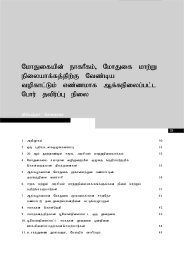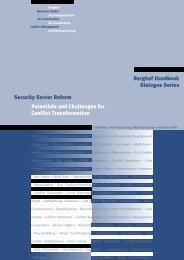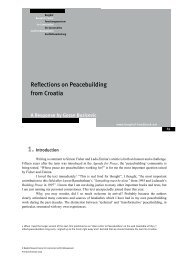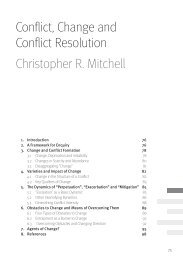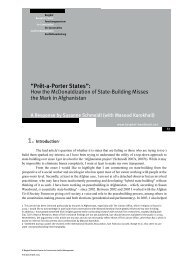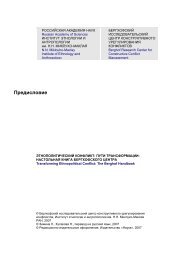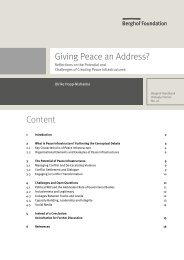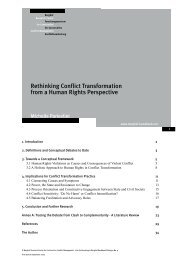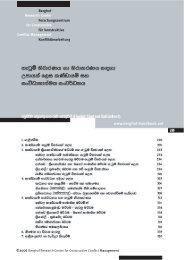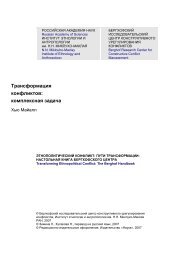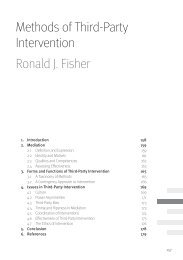Human rights and conflict transformation: The challenges of just peace
Human rights and conflict transformation: The challenges of just peace
Human rights and conflict transformation: The challenges of just peace
Create successful ePaper yourself
Turn your PDF publications into a flip-book with our unique Google optimized e-Paper software.
32<br />
Bergh<strong>of</strong> H<strong>and</strong>book Dialogue No. 9<br />
which he or she operates, <strong>and</strong> his/her relationships with <strong>conflict</strong>ing parties. It also matters what we<br />
underst<strong>and</strong> by advocacy, how this advocacy is done <strong>and</strong> what it is about. Advocacy is generally<br />
associated with speaking out, drawing attention to one’s cause <strong>and</strong> taking a clear, public stance on a<br />
particular issue or cause. Yet speaking out <strong>and</strong> taking a stance can also occur outside <strong>of</strong> the limelight,<br />
in the relationship between a facilitator <strong>and</strong> a <strong>conflict</strong> party, where criticism “may be accepted […]<br />
which would be ignored if it was made in public” (Lampen 1997); the non-adversarial approach to<br />
advocacy suggested earlier comes to mind here.<br />
Kraybill (1992, 13-14) distinguishes four types <strong>of</strong> advocacy: a party advocate promotes<br />
a particular party’s interests; an outcome advocate pursues an outcome that he or she considers<br />
desirable irrespective <strong>of</strong> who happens to benefit from it; a process advocate promotes a specific<br />
way <strong>of</strong> deciding things or getting things done, while a values advocate champions certain concepts<br />
or principles such as democracy, fair play <strong>and</strong> the rule <strong>of</strong> law. He argues that <strong>conflict</strong> <strong>transformation</strong><br />
practitioners ought to engage in the latter two types <strong>of</strong> advocacy <strong>and</strong> must be upfront about the<br />
values that motivate them <strong>and</strong> the nature <strong>of</strong> the process they facilitate (ibid). Outcome advocacy<br />
is not necessarily outside the realm <strong>of</strong> <strong>conflict</strong> <strong>transformation</strong> either, if understood as advocating<br />
in general terms for an outcome that fits within a <strong>rights</strong> framework, rather than for a specific<br />
substantive outcome (Galant/Parlevliet 2005, 117). Party advocacy, however, is problematic if one<br />
seeks to be acceptable as a facilitator or mediator to opposing parties in <strong>conflict</strong>. In other words,<br />
some forms <strong>of</strong> advocacy can be combined with acting in facilitative roles. Still, a practical challenge<br />
lies in the possibility <strong>of</strong> parties conflating an intervener’s values advocacy (e.g. on fairness, human<br />
<strong>rights</strong>) with party advocacy. This arises especially in asymmetric <strong>conflict</strong>s where advocacy <strong>of</strong> human<br />
<strong>rights</strong> st<strong>and</strong>ards is quickly perceived as reflecting a stance in favour <strong>of</strong> one party or another (e.g.<br />
Felner 2004).<br />
Of course, facilitation <strong>and</strong> advocacy are but two <strong>of</strong> the roles that are required in <strong>conflict</strong><br />
<strong>transformation</strong> processes; many others are relevant too. Generally, any one actor (organisation or<br />
individual) is likely to play multiple roles in a <strong>conflict</strong> context when working towards <strong>peace</strong> <strong>and</strong><br />
<strong>transformation</strong>. Pursuing role integrity is an important imperative in such instances; this means that<br />
an actor does not play any roles that have <strong>conflict</strong>ing principles or objectives (Arnold 1998b, 15).<br />
Where performance <strong>of</strong> one role may compromise the actor’s ability to function effectively in another<br />
role, we need to consider whether one <strong>of</strong> the two can be cast aside or transferred to another actor<br />
whose other functions are more in line with that role. A division <strong>of</strong> labour may thus ensue in which<br />
different actors intervening in a particular context play different primary roles.<br />
At times, a division <strong>of</strong> labour may be possible within one <strong>and</strong> the same organisation or<br />
network. Within the United Nations, for example, the Office <strong>of</strong> the High Commissioner for <strong>Human</strong><br />
Rights is positioned “as the ‘bad cop’ who should impose limits on the deals [senior UN <strong>of</strong>ficials]<br />
negotiate” (Hannum, 2006, 24). In Manical<strong>and</strong>, the churches developed a division <strong>of</strong> labour amongst<br />
themselves to balance their ‘<strong>peace</strong>’ <strong>and</strong> their ‘<strong>just</strong>ice’ roles, once they had clarified their different<br />
roles as a network <strong>and</strong> their respective strengths <strong>and</strong> limitations. A Nepali human <strong>rights</strong> organisation<br />
involved in <strong>peace</strong>building work tends to let its community activists focus on human <strong>rights</strong> education<br />
<strong>and</strong> facilitation <strong>of</strong> dialogue on issues <strong>of</strong> violence <strong>and</strong> human <strong>rights</strong> abuse, while its regional <strong>of</strong>fices<br />
emphasise advocacy, fact-finding <strong>and</strong> denunciation <strong>of</strong> human <strong>rights</strong> violations that occur at grassroots<br />
level. 15 When establishing role integrity through a division <strong>of</strong> labour amongst different actors,<br />
it is necessary to develop effective coordination <strong>and</strong> communication mechanisms in order to prevent<br />
them from working at cross-purposes. In this way, they can join their comparative strengths while<br />
15 Interview with regional coordinator <strong>and</strong> community workers <strong>of</strong> the Informal Sector Service Centre (INSEC), Nepalgunj <strong>of</strong>fice,<br />
Nepal.






